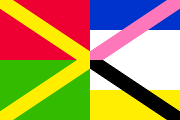Castilian Commonwealth of Nations

| |

| |
| Member Nations: | |
The Castilian Commonwealth of Nations (Mancomunidad Castellana de Naciones - MCN) was formed during the separation and dictatorship in Mother Castile, trying to bring the former Castilian colonies to the Kingdom in New Granada. Later, with the reunification of Castile, Castilian Spain joined as one more member state. Some of the goals of the community are free trade and free movement of people, as well as cultural exchange.
The members of the MCN are:
- Alta California
- Castilian Spain
- Central America
- Chile
- Bornei-Filipinas
- Malucos
- New Granada
- Peru
- Castilian Territories
- Venezôla
Pending members are:
Former members are:
History
During a great deal of the 20th century there where two Castiles: The Castilian State]], aka Castilian Spain, which became a republic after deposing king Juan VI in early 20th century to default in a phalangist dictatorship under General Tascon after a bloody civil war in the 1930's, and the Kingdom of Castile and Leon comprising most of the overseas territories of the former kingdom, which recognized king Juan VI and his successor queen Maria Luisa.
The kingdom set the temporary capital at Cadiz la Nôva in New Granada. This gave an increasing importance to the Americas and the American neighbors of Castile and Leon, including several former colonies, and an integration project began.
The process was not easy. Despite the fact that most of the people in Peru, Chile, Venezôla and Tejas continued to feel that Castile was the Mother Fatherland (Madre Patria), there were a lot of bad feelings not completely healed from the independence movements in early 18th century. Territorial claims from Mejico, Venezôla and Peru also played a part in these bad feelings.
In 1946, a first cultural organization was founded: the Castilian-American Organization for Culture and Science (OCCC) under the protection of Queen Maria Luisa. New Granada and Central America joined as separate members and the other founding members where Venezôla, Cuba and Chile. Soon Peru, Alta California and Mejico joined as well.
By 1951 the OCCC changed into the "Mancomunidad Castellanoamericana" (Castilian-American Commonwealth - MC), and the goals included also a common market and further integration, easing migration barriers between member states, and pursuing pacific conflict resolution. The Canary Islands and Tejas joined the MC in 1952 and Florida-Caribbea asked to join, too.
The Cuban revolution in 1953, followed by the annexation to Florida-Caribbea stopped the process and lessened the relationships between Florida-Caribbea and the MC. Florida-Caribbea decided to found its own organization. Tejas soon left the MC as the war between Tejas and Alta California heated up again. In 1961, Florida-Caribbea and Tejas formed the Gulf Alliance (AGM), with goals similar to thosse of the MC]], and they began an intensive diplomatic campaign to get more MC nations on their side.
In 1954 Bornei-Filipinas and the Malucos joined the MC. However, their cultural affiliation with other MC countries had been on a steady decline, and the retention of MC membership has been in heavy dispute ever since.
Venezôla in 1964 and Mejico in 1969 retired from the MC and joined the AGM which became the CELCAGOM (Community of Independent States of the Caribbean and the Gulf of Mexico).
In 1967, after Tascon died, the monarchy was restored in Iberian Castile, and Maria Luisa's son Eduardo was crowned king, according to the testament of Tascon who wanted to prevent liberal Maria Luisa from ruling again in Iberia.
Eduardo wanted, however, a tighter integration between the two Castiles and the first attempt came through the MC]]. Iberian Castile joined the MC as a new state member in 1969, and the union was renamed the "Mancomunidad Castellana de Naciones" (MCN – Castilian Commonwealth of Nations).
Eduardo died in 1975 and his heir was his nephew Alfonso José, grandson of Maria Luisa. Seeing a unique opportunity to reunite the kingdom, Queen Maria Luisa resigned her crown to her grandson and Alfonso José became king of the Two Castiles. Alfonso José promoted common institutions and a democratic transition. He finally resigned most of his political powers in 1978, when the reunification of the Kingdom of Castile and Leon was complete.
Composition and goals
The current MCN members are Alta California, Bornei-Filipinas, Castilian Spain, Central America, Chile, the Malucos, New Granada and Peru. The Canary Islands resigned the standalone membership and is represented through the Castilian Territories, a figure also including Western Sahara, Guam and Intramuros.
Currently, any citizen of an MCN member state is a citizen of the MCN and can move to any other MCN country without passport. Most goods are also allowed to cross boundaries without tariff and military vessels of Alta California, Chile and Peru can cross the Nicaragua Canal without fee. King Alfonso José is recognized as the head and chairman of the MCN.
Conflicts between MCN members should be resolved peacefully and there have been no war situation yet. However, the MCN is not a military pact. The MCN was neutral in the conflict between Alta California and Tejas, but not impartial (no MCN member was allowed to sell weapons to Tejas, for example). There is no monetary union either. The Kingdom, Alta California, Peru and Chile each have its own currency (all of them called peso: peso real, peso californiano, peso peruano, peso chileno), but they have fixed exchange rates.
Before the disintegration of the CELCAGOM, Venezôla had expressed its will to rejoin the MCN, and the MCN is still open to new members. Peru and Chile are also members of the Andean Pact, and there are also talks to integrate the other AP members into the MCN: Tawantinsuyu, Charcas, and Araucania. (Charcas and Tawantinsuyu are likely to join, Araucania and Patagonia|Araucania much less so.)
The Andean Pact is less ambitious than the MCN.
After the dissolution of the CELCAGOM, Cuba, Tejas and Porto Rico had expressed a desire to join the MCN again.
